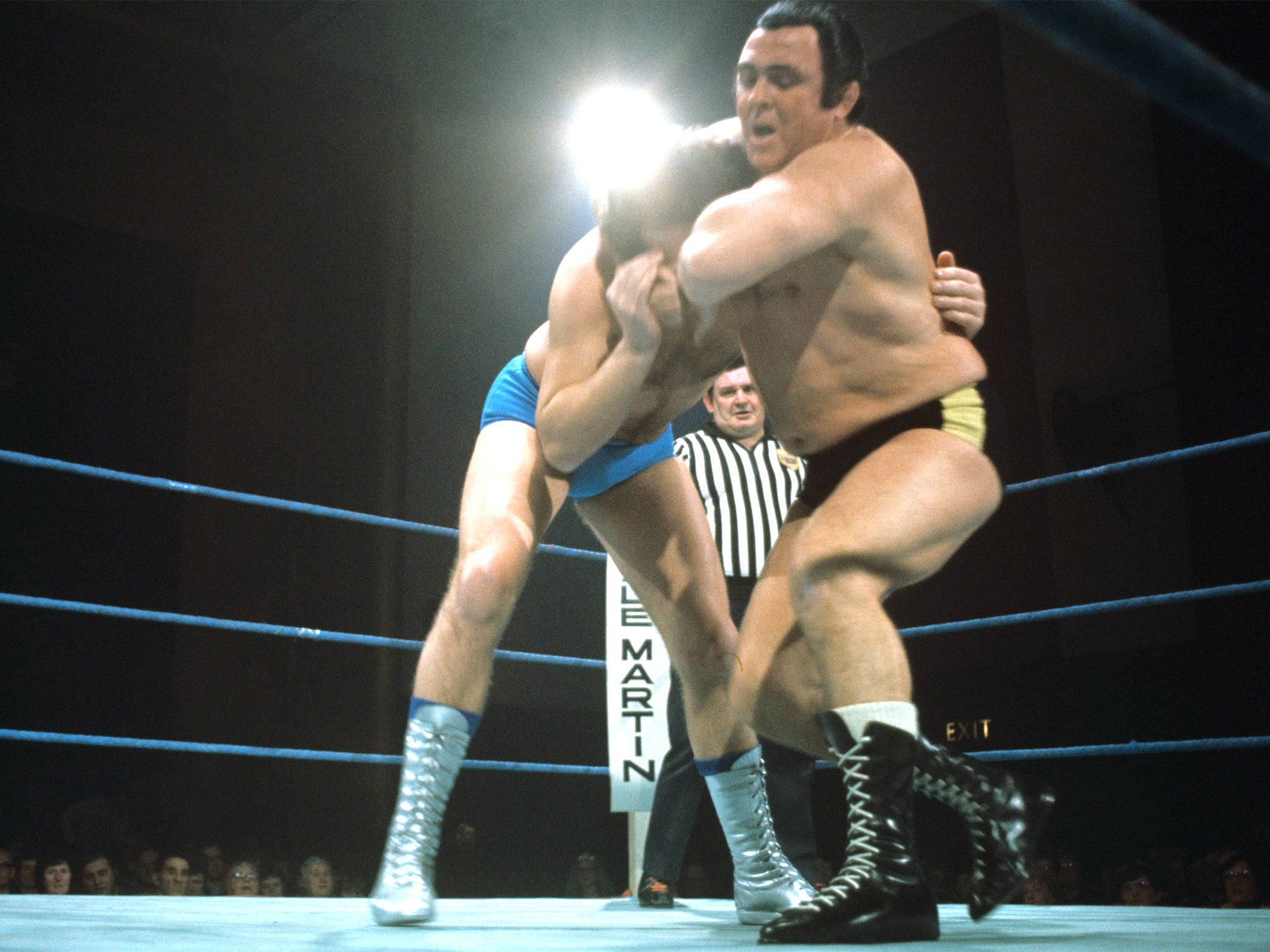Mick McManus: Wrestler who revelled in his status as the man the British public loved to hate

Mick McManus was one of the greatest British wrestlers. An enormously popular figure who delighted in the nicknames of "The Man You Love to Hate" and "The Dulwich Destroyer", he was renowned for pushing the rules of the sport to their limits and for deliberately turning the crowds against him for theatrical effect.
From the 1960s to the mid-'80s wrestling had a regular 40-minute Saturday afternoon slot on ITV's World of Sport just before the football results. Wrestling fans could watch bouts involving a host of theatrical characters who had, through their antics, become stars of the small screen, showmen such as McManus's great rival Jackie Pallo, as well as Giant Haystacks (Martin Ruane), Catweazle (Gary Cooper), Big Daddy (Shirley Crabtree), Kendo Nagasaki (Peter Thornley) and, of course, McManus himself.
At 5ft 6in and 12 and a half stone, in his trademark black trunks and short-cropped black hair with widow's peak, he was instantly recognisable in or out of the ring. His catchphrase, uttered to his rivals in the ring, was "Not the ears, not the ears", a plea to avoid his "cauliflower" ears.
"Mick McManus was a household name" said Brian Elliott, editor of Fighting Spirit magazine. "That term, much like 'legend', has been overused greatly, but McManus is a true example of both, in the days where millions of people gathered around their televisions every Saturday afternoon. To wrestling fans, McManus was an icon. To the average TV viewer, he was a star."
He was born William Matthews in 1928 in New Cross, London. He started wrestling in 1947 at the John Ruskin Amateur Wrestling Club, where he encountered his soon-to-be rival Eddie Capelli. He won his first title two years later, defeating Capelli to win the British welterweight championship.
By the late 1960s he had moved up to middleweight and in November 1967 he took the British championship from Clayton Thomson. In June the following year he won the European middleweight championship, beating Vic Faulkner. After losing to Faulkner a few months later he regained the title in 1971 and held on to it for the next seven years.
With the advent of regular TV wrestling McManus became a star, a result of his serious take on the sport and his carefully crafted hard-man image. But behind the tough exterior McManus remained a gentleman, as his fellow wrestler Johnny Kincaid recalled, speaking about his first televised match against McManus, in October 1969: "I had wrestled with McManus only once before at the Granada, Tooting, and as I remember it was one hell of a fight. I was beaten as expected, but he came to me afterwards and said I was better than he expected and thanked me for a good match."
He said of this time, during the peak of his television fame, "I used to love the crowds, especially the way I'd wrestle. I used to get a kick out of manipulating the hordes. I'm not being big-headed, but I could really bring them up and down and drive them mad and then tone them right down, keep them quiet and sort of wrestle sometimes, not doing anything particularly bad, just wrestle nicely and it was like waiting for the other boot to drop. They never knew when I was going to start doing something which I shouldn't do, something which they didn't like, something which they could scream and shout at."
Introducing the video of a 1975 televised bout between McManus and Catweazle, the World of Sport presenter Dickie Davies commented: "If Jackie Pallo was the glamour boy, the original hard man was surely Mick McManus, Pallo's arch-rival. Introduced on one occasion to Princess Anne, McManus could only submit in silence when Her Royal Highness quipped 'I didn't recognise you with your clothes on'."
McManus collaborated with Charles Arnold on The Mick McManus Wrestling Book (1970), a guide to the sport. On retirement he remained active in wrestling as a promoter and worked for a period with ITV in an advisory role. Last year the Wrestling Observer Newsletter inducted him into its Hall of Fame.
In the book Sportsviewers Guide – Wrestling (1983) by Peter Bills, McManus said of his career in the sport: "I owe wrestling a great deal – it has given me so much. I've met interesting people, travelled the world and enjoy a good lifestyle through the sport."
Frank Rimer, who organises the annual British Wrestlers Reunion, commented that "Mick never recovered from the loss of his beloved wife Barbara and lost the will to live, despite the loving care of the nurses at the celebrity home for retired actors, Brinsworth House, where he lived out his final days. Even the arrival of his old friend Lord Richard Attenborough recently failed to lift his spirits, refusing all food and drink until he quietly slipped into a coma three days ago.
"Mick was without doubt, through his own efforts, the greatest wrestling name that the UK has ever seen or will see again, and even 25 years after his retirement, he retained his aura of stardom until the end."
Marcus Williamson
William George Matthews (Mick McManus), wrestler: born New Cross, London 11 January 1920; married Barbara; died Twickenham, London 22 May 2013.
Join our commenting forum
Join thought-provoking conversations, follow other Independent readers and see their replies
Comments